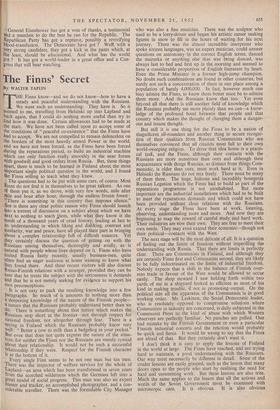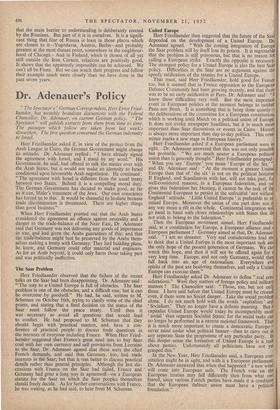The Finns' Secret
by WALTER TAPLIN The questions had to be put with some care, of course. Most Pinns do not find it in themselves to be great talkers. As one of them put it, as -we drove, with very few words, mile after !tile and hour after hour, through the endless frozen forest: "There is something in this country that imposes silence." Nor is there any clear politic reason why Finns should launch into a torrent of discussion on a subject about which we have next to nothing to teach ahem, .while what they know is the result of a thousand years of cruel history, leading at last to an understanding in which liking and disliking, contrast and similarity, war and peace, have all played their part in bringing about a complex relationship full of difficult nuances. Yet they certainly discuss the question of getting on with the Russians among themselves, thoroughly and avidly, as is natural with people whose lives depend on it. Finns who have visited Russia fairly recently, usually business-men, quite often find an eager audience at home wanting to know what they found there. And these recent visitors will also discuss Russo-Finnish relations with a stranger, provided they can be sure that he treats the subject with the 'seriousness it demands and that he is not merely seeking for evidence to support his own preconceptions. It is not easy to pack the resulting knowledge into a few Paragraphs. So much of it amounts to nothing more than a deepening knowledge of the nature of the Finnish people— a nature that the Russians probably understand better than we do. There is something about that nature which makes the Russians stop short at the frontier—not through respect for national freedom, nor altogether through fear. There is a saying in Finland which the Russians probably know very well: " Better a cow to milk than a hedgehog in your pocket." but even that does not quite express the nature of the situa- tion, for neither the Finns nor the Russians are merely cynical about their relationship. It would not be such a successful relationship if they were. Respect' for the Finnish character is at the bottom of it.
Every single Finn seems to be not one man but ten men. There was the inspector of welfare services for the whole of Lapland—an area which has been transformed in seven years from the scorched wilderness which the Germans left into a great model of social progress. This man was also an expert hunter and tracker, an accomplished photographer, and a con- siderable traveller. There was the formidable City Manager who was also a fine musician. There was the sculptor who used to he a lorry-driver and began his artistic career making figures in snow to fill in the hours of waiting .for his next journey. There was the almost incredible interpreter who spoke sixteen languages, was an expert musician, could answer questions on astronomy,in the correct English terms, danced the mazurka or anything else that was being danced, was always last to bed and first up in the morning and seemed to have a considerable proportion of English literature by heart. Even the Prime Minister is a former high-jump champion. No doubt such combinations are found in other countries, but surely not such a concentration of them in one place among a population of barely 4,000,000. In fact, however much one May admire the Finns, to know them better must be to admire them more. And the Russians know that too. Yet even beyond all that there is still another field of knowledge which the Russians probably see more plainly than we can—a know- ledge of the profound bond between that people and that country which makes the thought of changing them a danger- ous and insane thought.
But still it is one thing for the Finns to be a nation of Magnificent all-rounders and another thing to secure recogni- tion of their qualities from Russian Communists who are themselves convinced that all citadels must fall to their own world-sweeping religion. To drive'that idea home is a practi- cal task, and the Finns, although their contacts with the Russians are more numerous than ours and although their acquaintance with things Russian, as distinct from things Com- munistic, is older than ours, must work hard at it. Even in Helsinki the Russians do not mix freely. There must be many of them there. The huge, hideous and incredibly bourgeois Russian Legation which the Finns had to build as part of the reparations programme is not uninhabited. But more important are the industrial installations which had to be built to meet the reparations demands and which could, not have been provided without close relations with the Russians. At every stage the Finns have been at work, listening, observing, understanding more and more. And now they are beginning to reap the reward of careful study and hard work. Their industries are now their own. They are free to meet their own needs. They may even extend their economic—though not their political—contacts with the West.
The next stage will be the most delicate of all. It is a question of feeling out the limits of freedom without imperilling the understanding with Russia. That there are limits is perfectly clear. There are Communists in Finland, and although they are certainly Finns first and Communists second, they are likely to be fully indoctrinated on the limits of industrial freedom. Nobody expects that a shift in the balance of Finnish. over- seas trade in favour of the West would be allowed to occur easily. The shop steward I saw holding forth within two yards of me in a shipyard looked as efficient as most of his kind in making trouble, if not in promoting output. On the political side all the apparatus of the Communists is in good working order. Mr. Leskinen, the Social Democratic leader, who is resolutely opposed to compromise solutions where Communists in industry are concerned, is daily subjected in the Communist Press to the kind of abuse with which Western observers are perfectly familiar. No punches are pulled. One bad mistake by the Finnish Government or even a particular Finnish industrial concern and the reaction would probably be quick and fierce. It would be wrong to say that the Finns are afraid of that. But they certainly don't want it.
I don't think it is easy to apply the lessons of Finland in the world at large. The Finns have reached, and are trying hard to maintain, a good understanding with the Russians. Our way must necessarily be different in detail. Some of the cruder lessons are easily grasped, such as the lesson that many doors open to the people who start by realising the need for hard and unremitting work. But these lessons are also trite. Much the same applies to the lesson that all the actions and words of the Soviet Governmerit must be examined with microscopic care. It is obvious. It is also obvious that the main barrier to understanding is deliberately erected by the Russians. But part of it is in ourselves. It is a signifi- cant thing that fear of Russia is least in those places which are closest to it—Yugoslavia, Austria, Berlin—and probably greatest at the most distant point, somewhere in the neighbour- hood of Chicago.• And in Finland, which is closest of all yet still outside the Iron Curtain, -relations are positively good. It shows that the apparently impossible can be achieved. We can't all be Finns. But we can watch their progress and follow their example much more closely 'than we have done in the past seven years.











































































 Previous page
Previous page